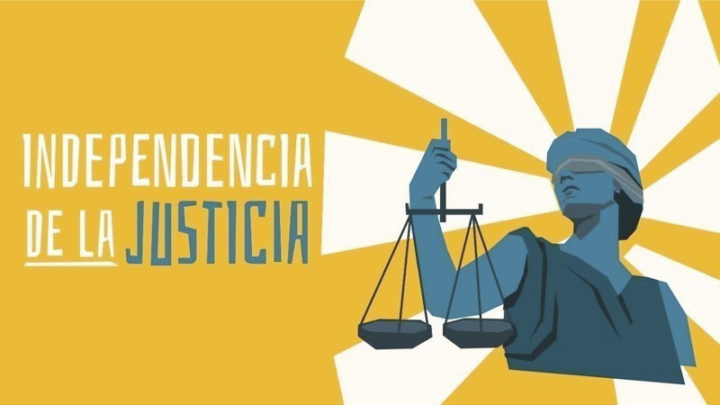Today, Colombian democracy is facing one of its most difficult moments. The President of the Republic and the Government party are carrying out an aggressive campaign against rights, the balance of powers, the Courts, and judicial independence; dangerously advancing towards authoritarianism and an end to the essential pillars of rule of law.
This authoritarian assault is especially focused on the Courts and judicial independence, seeking to decimate any possibility of establishing democratic limits to the executive branch’s and state institutions’ arbitrary actions, as well as ignoring rulings handed down by different judicial bodies to guarantee citizen rights and with the aim of materializing fundamental tenants.
It is crucial that we aren’t misled by rhetoric: the attacks against the justice system are not against a specific judge or court, this is an attack against all citizens and especially against the guarantees that any individual, but especially government employees, not use state money, means, or weapons to infringe upon our rights and honor.
There have been several attacks against and recurrent contempt for judicial decisions, including the response to the Administrative Court of Nariño’s ruling ordering the government to suspend a virtual public hearing as the alleged fulfillment of prior consultation with communities from 104 counties on aerial fumigations with glyphosate. Despite the ruling, the Minister of Defense did not take pause in announcing that use of this dangerous agro-toxic would be reinitiated.
Also, in response to the provisional arrest warrant ordered by the Special Arraignment Chamber of the Supreme Court of Justice against ex- president and ex- senator Álvaro Uribe Vélez, the President of the Republic and several high-level government employees strongly questioned and criticized the decision. The ruling must be accepted or questioned by means of the mechanisms established within the judicial system.
Similarly, recent abuses perpetrated by State Security Forces have also opened a debate regarding the Military Criminal Jurisdiction, which, contrary to international treaties has assumed the jurisdiction to investigate and try grave human rights violations committed by state agents, including the murder of Dilan Cruz and the Tandil massacre that occurred in 2017 in the department of Nariño.
The Executive’s most recent attack against judicial independence was in refusing to obey the tutela (writ of protection of constitutional rights) ruling from 22 September, when the Civil Cassation Chamber of the Supreme Court of Justice ordered, among other immediate measures, that the government publicly ask for forgiveness for serious human rights violations committed by public servants during last year’s national strike, when the State Security Forces intervened in a violent and arbitrary manner and using potentially lethal weapons, one of which caused the death of Dilan Cruz in the city of Bogotá. They also used irritating chemical agents to arbitrarily breakup protests, in addition to illegally holding individuals and attacking the press.
In addition to asking for forgiveness, the Civil Chamber ordered the Government to maintain a neutral position in relation to nonviolent protests, creating distinct protocols to guarantee this right, to activate a working group with stakeholders from the social protests, and suspend the use of 12-gauge shotguns used to intervene during the protests.
Contrary to this decision, the Government—again through the Minister of Defense—announced a request to have the Constitutional Court’s ruling reviewed and failed to fulfill the terms of how they should ask for forgiveness, appealing to a statement made on 11 September – before the Court’s decision was known and which said, “this spontaneous expression of apology refers to any violation of the law, at any time, which has involved any member of the institution.” This was unacceptable for the victims and organizations who filed the tutela as it did not reference the incidents or recognize the systematic nature of police abuses and the need for structural reforms, as was indicated in the ruling.
The open contempt from President Duque and the Minister of Defense regarding this ruling— shortly after thousands of videos showed the Police shooting at and attacking citizens on 9 and 10 September of 2020, when thirteen people were also murdered—is not only an attack on a crucial element of modern democracies, for example judicial sovereignty, but also against the necessary subjection of military power to civil power. Hence, the message sent by the executive to members of the State Security Forces who violate human rights could not be more terrifying: shoot, attack, and use violence, the national Government supports you.
Also, by ignoring the ruling the national government is denying Colombians the right to transition towards peace, towards overcoming the idea that social protests are more a public disturbance instead of being seen as a manifestation of a democratic right that, although it may be disruptive, shows the strength of public deliberation and democracy in a country.
We call on the Minister of Defense and Iván Duque Government to not use the judiciary or its rulings as an electoral battle horse, that it cease all attacks against the administration of justice, and that it comprehensively comply with judicial rulings, including the Supreme Court of Justice ruling in relation to the right to peaceful protest. Let us remember that in a democracy nobody is above justice, particularly not the President of the Republic.










